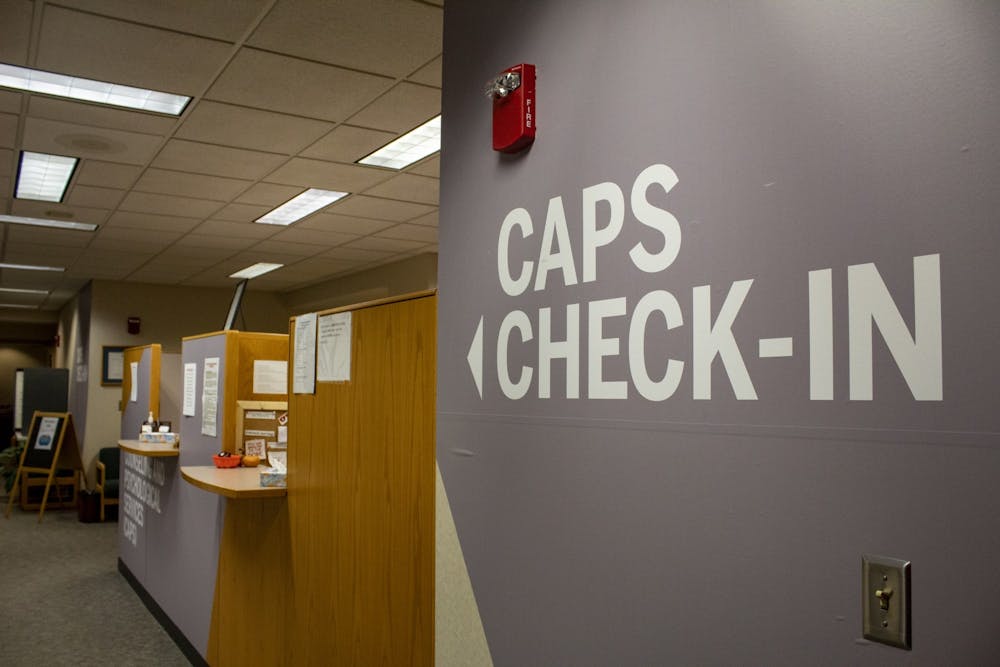More students than ever are seeking mental health care. This is a positive change but has resulted in campus mental health care resources that never seem to be enough. What used to be a problem of stigma facing students with mental health concerns has shifted to become a lack of resources for the many students seeking mental health care from their campus health centers.
Anxiety and depression continue to be top concerns for many students, with anxiety showing a slight increase since last year, according to Penn State’s Center for Collegiate Mental Health 2020 Annual Report. The report additionally finds that trauma has become a more significant concern, especially since 2016.
These statistics are difficult to interpret. Increased self-reports of anxiety, depression, trauma and “threat-to-self” characteristics may be the result of greater prevalence, increased comfort with reporting or both. From 2014 to 2019, the number of students seeking mental health care has increased by 35% compared to just 5% increase in enrollment, according to an Associated Press analysis of 39 large state universities.
In my three years on the Mental Health Committee for Culture of Care, I’ve heard countless stories of how students are dissatisfied with the quantity and quality of support from IU’s Counseling and Psychological Services, citing long waitlists and shortened one-on-one sessions, among other complaints. Some students have also lamented that CAPS offers only two free counseling sessions per semester.
However, we shouldn't blame CAPS.
While many of the Big Ten schools do not restrict their students to only two tuition-paid visits per semester, the problem of lacking the necessary mental health resources to effectively treat students is felt nationwide. At Northwestern University and the University of Michigan, for example, the student health fee covers all CAPS services without a limit on the number of sessions.
CAPS strives to keep the wait time for initial appointments to no more than a week, CAPS Director Denise Hayes said. The wait for these intake appointments, however, can often be closer to two weeks, Hayes said.
Many students can’t wait three weeks for just an intake appointment. It’s important to note, though, that emergency appointments are available every day from 8 a.m. to 4:30 p.m. with a crisis line open 24/7.
CAPS receives 75% of its funding from the mandatory student health fee, IU Health Center Executive Director Peter Grogg said. About 14% of funds come from fees for services, and only 9% comes from the IU Bloomington Provost Funds, the general budget for academic and other campus spending.
The health center has hired more counselors in recent years, but meeting the demand with a tight budget is no easy task. Master’s-level counselors cost roughly $68,000 a year, and Ph.D. psychologists earn $98,000 annually between salary and benefits, Grogg said. Using IU Health Center's funding model, hiring more staff and increasing CAPS’ ability to treat students would most likely mean an increase in the annual student health fee.
This lack of proper funding for mental health services has come, particularly this year, at great contrast to the funds used to build the relocated Metz Carillon and the Indiana Memorial Union renovation. While this is frustrating, it’s not quite accurate to say that IU funded the Carillon at the expense of CAPS. Building and renovation are often funded by private donations and public grants that cannot be used for the CAPS budget.
In the meantime, however, students should know the resources available to them for mental health care.
Besides individual therapy sessions, CAPS offers free mental health workshops throughout the semester focused on mindfulness, substance abuse and anxiety management. It also provides group therapy, couples counseling and counseling sessions via video chat.
IU Crimson CORPS, a group of undergraduate students trained and supervised by CAPS, provides informal counseling and non-judgmental peer support. Their office is located on the 4th floor of the IU Health Center.
The Center for Human Growth, a part of the School of Education, provides counseling to students and non-students from trained graduate students studying counseling and educational psychology.
Let’s Talk, another program initiated by CAPS, helps students to find solutions to everyday problems in a confidential and informal setting. Let’s Talk Now offices are located in the LGBTQ+ Culture Center, the Student Academic Center and the Atkins LLC in Forest Residence Hall.
The state of mental health services at CAPS presently is frustrating and underfunded. While I believe we can work to bring more funding to these services from the university, please take advantage of the various other sources for mental health care.
Everett Kalman (he/him) is a junior studying law and public policy and is the vice president of external affairs for Culture of Care at IU. He plans on practicing immigration law in the future.






